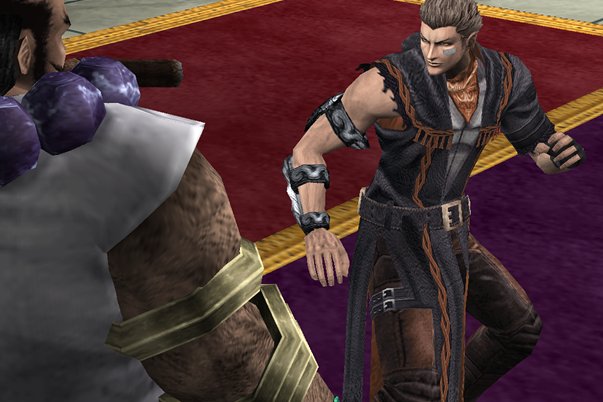Grabbing the God Hand
We speak to the creator of the most unusual games in Capcom's stable about his current opus... and the future
Can you talk about some of the stylistic or gameplay influences? Maybe other movies or other games that influenced the direction that you took God Hand?
Inaba: God Hand doesn't really have one really over-riding work that really influenced... Everybody who worked on it kind of enjoyed their own things, and wanted to put little gags into the game. So Mikami-san wanted to put stuff in. I wanted to put stuff in. JP, the translator, writing the English text, wanted to put stuff in. So everybody kind of wanted to put their own essence into the game and their own little influences and what movies and what things they liked best. For instance, classic Japanese sentai [Power Rangers-style] action heroes - those influences are in God Hand. So it's kind of a potpourri mish-mash of everything.
God Hand has a kind of interesting and different approach to the camera system in terms of a beat 'em-up. And I was wondering why that came about? Was that influenced by Resident Evil 4?
Inaba: The camera system was something that we approached as something we wanted to make where people could enjoy fighting with people, and enjoy watching the fight with someone, and that's kind of how the camera came about. So, at first it was something that was much closer in and you couldn't really see the other enemies - it was just about a one-on-one fight. And then we decided, well, it might be better to see a bit more, so we pulled the camera out and we pulled it about a Resident Evil 4 length. We realized this wasn't so bad.
Now, the difference between the camera in God Hand and the camera in Resident Evil 4 - in Resident Evil you're doing a lot of shooting and you're shooting at [enemies] very far away whereas in God Hand the enemies are very up in your face. So in Resident Evil 4 you have a lock-on so you can get to these enemies that are far away. But in God Hand there's no need for a lock-on because those guys are so close enough into you that you just want to go up and start fighting with them. So that's kind of the genesis of the camera system.

The game itself - beat 'em-ups certainly, especially in the US - have a reputation for being kind of a hardcore gamer genre. But the humor might appeal to a wider audience. Is it difficult to balance the different audiences that might enjoy a game like this?
Sign up to the GamesRadar+ Newsletter
Weekly digests, tales from the communities you love, and more
Inaba: From a producer's standpoint - while God Hand has lots of things that appeal to hard core users, if you make a game that appeals solely to hard core users, then you can only sell your game to hard core users. So the humor in the game kind of acts as a gateway to bring all these users who might not necessarily be interested in buying a hardcore beat 'em-up into the game. And letting them touch the game and enjoy the game. So I think that's kind of how we found the balance.


